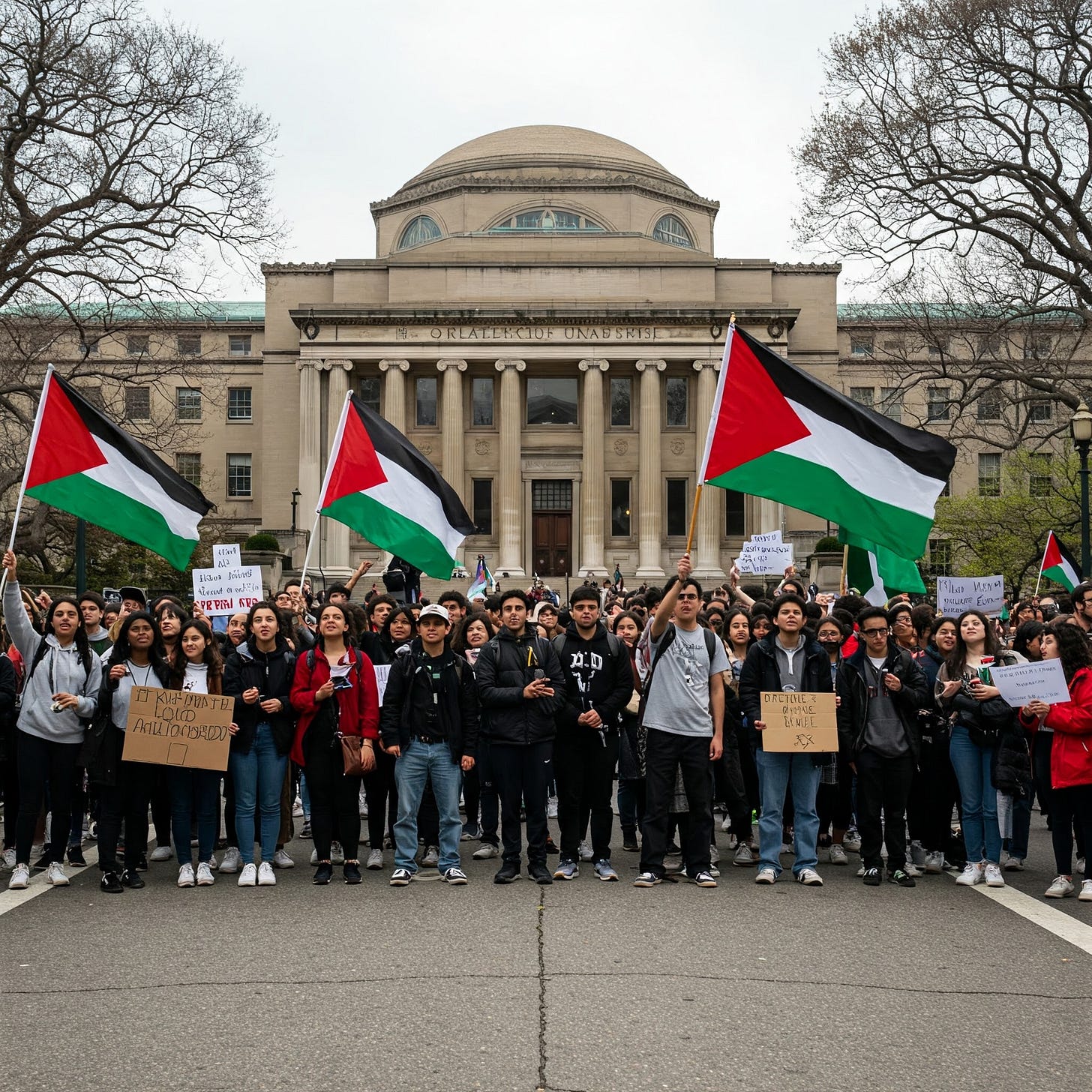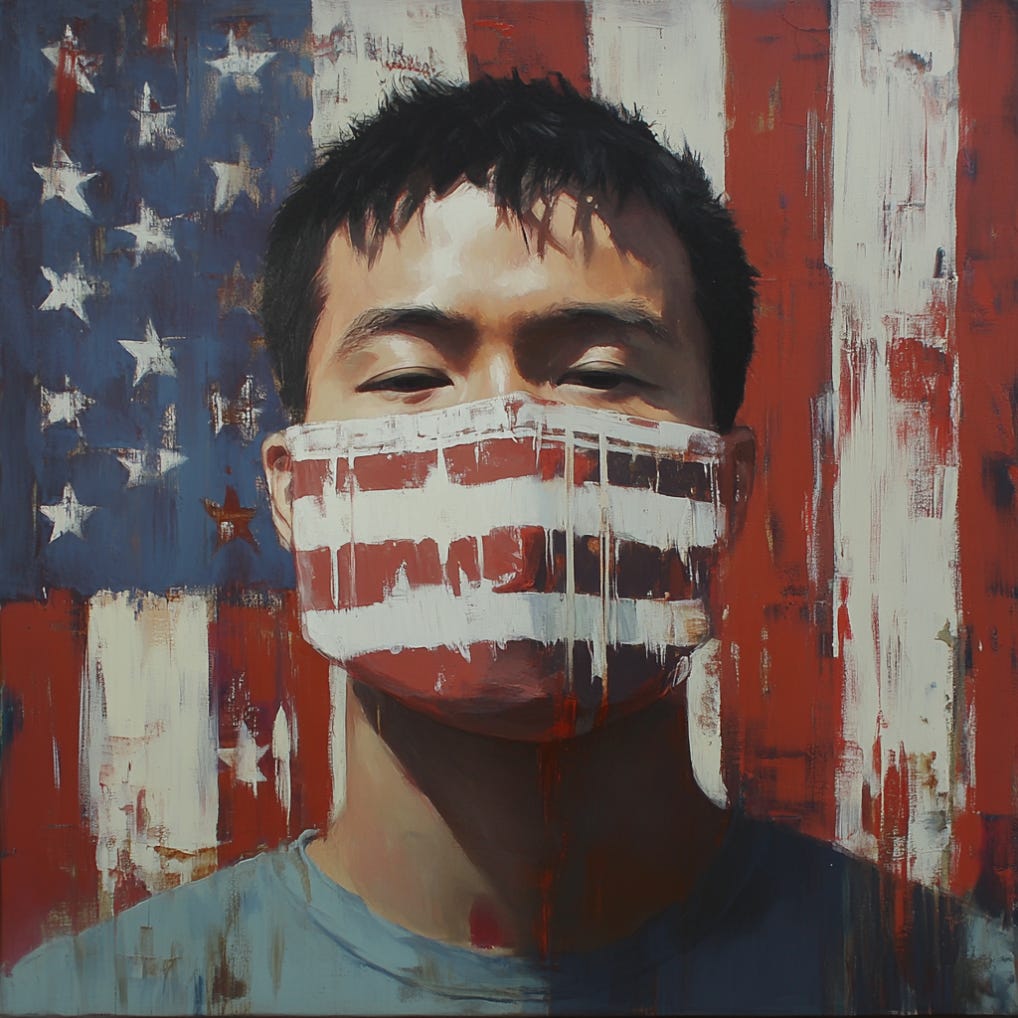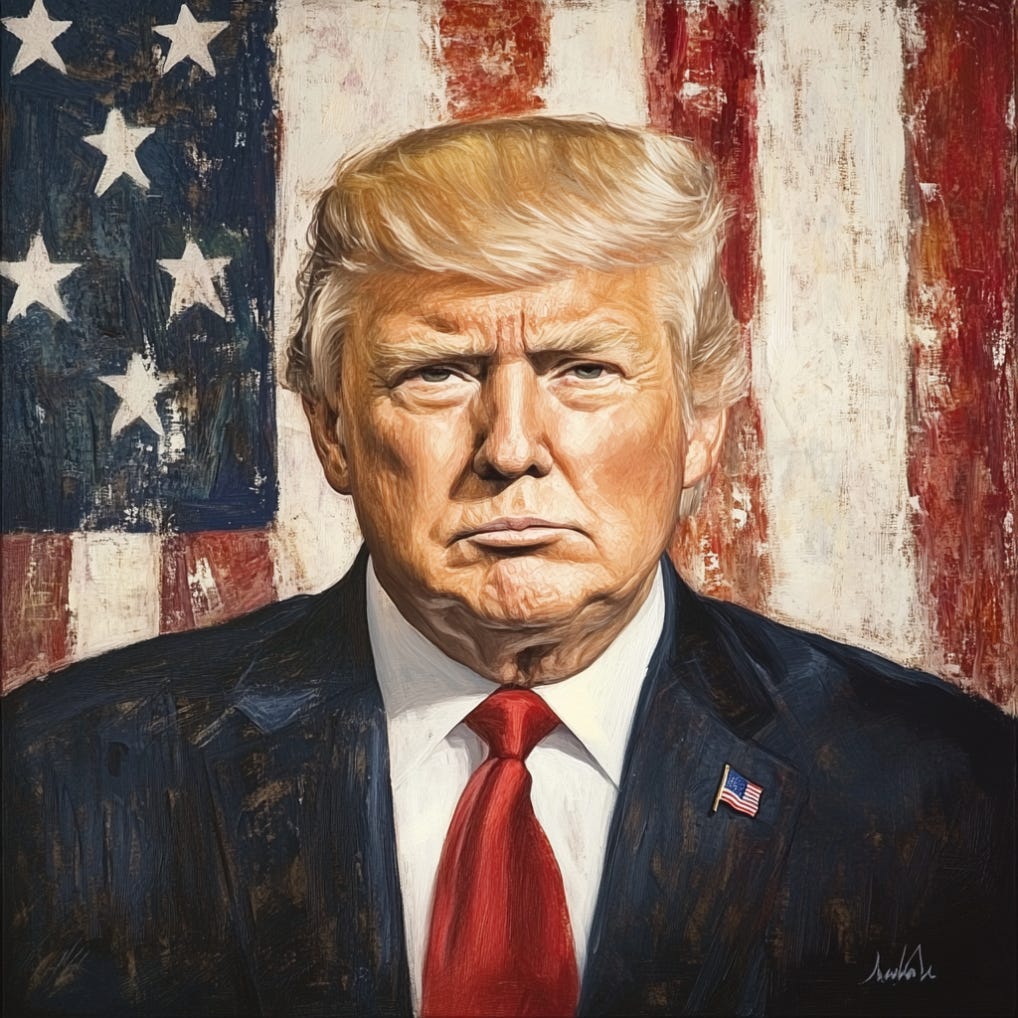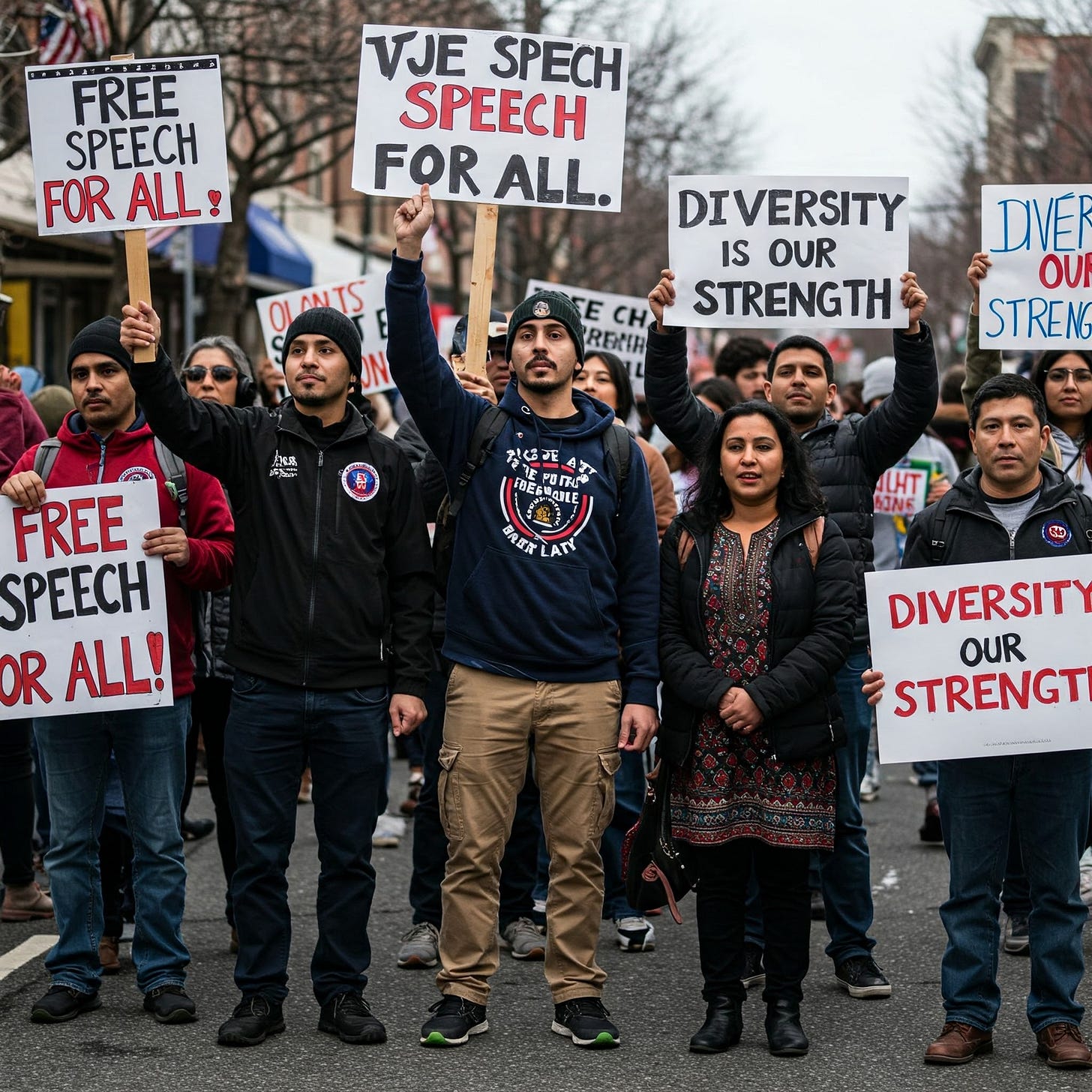Mahmoud Khalil: A Columbia Protester Arrested by ICE & Facing Possible Deportation under Trump - Free Speech vs. Non-Citizen Rights
Mahmoud Khalil is a non-American student at Columbia who joined protests in favor of Palestine... ICE wants to deport him.
I’ll start this by making it clear: I strongly dislike foreigners who enter the U.S. and regularly partake in protests/marches, etc. Why? They are non-citizen guests in the U.S. — the U.S. doesn’t owe them anything or the same rights as actual citizens.
When people claim non-citizen foreigners deserve the same rights as U.S. citizens they instantly lose me… their logic is mentally retarded. Extending this logic one would argue that non-citizens should be able to:
Vote in U.S. elections
Run for federal public office (Prez, Congress, etc.)
Serve on federal juries
Have an unconditional right to live in U.S. without deportation
Get a U.S. passport
Get protection from U.S. embassies & consulates abroad
Sponsor family members for immigration
Receive full eligibility for government jobs
Legally access all federal public assistance programs
Be protected from extradition to other countries
Get certain state/federal professional licenses
Be eligible to receive scholarships, grants, financial aid, etc.
Nobody truly believes that non-citizens should have the same rights as U.S. citizens (besides select mentally ill/deranged liberals). The fact is that if you are a non-citizen student in another country, it’s probably a good idea to stay in your lane (study, take up normal hobbies, etc.).
If you dislike the fact that you aren’t afforded certain rights, you always have the option to: return to your homeland or go elsewhere. Remember, nobody is forcing you to select and/or stay in the U.S. — you can always leave.
If a U.S. citizen partakes in some crazy protest in certain Middle East countries, they’ll likely end up: (1) thrown in prison (with an insane sentence); (2) apprehended by gov officials, slashed up or shot, and tossed dead in a ditch; or (3) abducted by ISIS or some other batshit terrorist org only to have their throat slit with a video recorded and uploaded online by a group of barbarians.
Obviously these Middle East countries (outside of a few civilized gulf states: UAE, Qatar, Saudi, etc.) are savage places and should be avoided by those with functioning brain cells — especially if you don’t know the language or aren’t Arabic — not all cultures are the same (as a result of tiny genetic evolutionary differences).
All that said, I believe the United States (U.S.) and other elite countries should hold themselves to a higher standard — and they do. The U.S. is far more civilized, intellectually advanced, and has achieved a lot of success as a result — it historically attracted the best/brightest.
This longwinded intro brings me to a recent news story about a student at Columbia University named Mahmoud Khalil. Khalil was involved in a series of protests in support of Palestine — leading and/or speaking at many of them.
And although I think protesting is braindead (mostly fails to achieve anything of significance, wastes time, and is an annoyance) AND that Mahmoud Khalil probably should’ve taken up other hobbies — if he didn’t break any laws, I think he should be allowed to protest freely without detainment/deportation by ICE.
“I disapprove of what you say, but I will defend to the death your right to say it.” — Evelyn Beatrice Hall (1906); wrote to encapsulate Voltaire’s stance on civil rights
I don’t necessarily agree with this quote in the first place… but I especially don’t agree with it in the case of non-citizen foreigners in the U.S. Why? Non-citizens should not be granted the same rights as U.S. citizens.
If we gave all non-citizens the same full “free speech” rights as regular citizens, adversarial countries could send sleeper cells of well-funded “students” (i.e. operatives) with intent to disrupt society and/or instill chaos/dysfunction. (Unclear as to whether they’d be successful… and we may already have enough homegrown dysfunction/chaos — but we don’t need to invite more.)
This should be common sense.
If you are a guest in someone else’s home, and let’s say the host is extremely gracious but is strongly against abortion due to his/her faith. You know this, yet at dinner you routinely bring up the fact that you strongly support abortion, turn it into a debate, things get heated, etc.
In this type of scenario, you’ve demonstrated zero situational/social awareness. It’s in your best interest to just avoid that topic… talk about the weather or the food or sports or… anything. Yet you keep hammering away at why pro-choice is superior.
Eventually the person opts to kick you out of their house. Now you’re surprised and don’t think they should’ve done that. After all, you should have freedom to speak your mind, right?
This is an imperfect analogy, but you get the gist. The U.S. is strongly aligned with Israel, Khalil was heavily involved in leading protests aligned with Israel’s adversary (Palestine) — and by default an indirect adversary of the U.S.
At some of the protests he was involved with, certain individuals within the protest groups allegedly praised Hamas. Though he maybe personally didn’t praise Hamas — he is linked to the radicals by association and was leading these groups.
Furthermore, some might argue (though this is a reach) that simply protesting in favor of Palestine is expressing support for a terrorist organization (Hamas) by proxy. How? The Palestinian people overwhelmingly voted for Hamas in free/fair elections and largely support them… so the logic would go: supporting Palestine/Palestinians = supporting Hamas (the cohort they chose to run the country).
It is known that ~72% of Palestinians (nearly 3 in 4) supported the October 7 terror attack against Israel. So if you are supporting Palestinians, one could argue that you are supporting people who support terrorism (they voted for Hamas and liked these attacks). Now that they’re facing severe punishment for their actions (i.e. “FAFO”) — many want you to have sympathy for this group.
And I kind of understand the argument. These people are inbred, brainwashed, religious fanatics who don’t really know any better. So although you could glass their entire country, maybe have some mercy (even though they wouldn’t have any for you if they had the upper hand).
Alright, but living in the U.S. as a legal student/resident is different than being a guest in someone else’s house and subjective “house rules” are different than actual U.S. law… I agree.
Which is why I think the following: Unless there is clear-cut evidence Mahmoud Khalil broke laws (e.g. disturbing the peace, conspiring against the U.S., leading pro-Hamas protests, etc.), he should NOT be detained or deported — even if some wackos in his group were doing this. Obviously I do think he should’ve had a bit more situational awareness (non-citizen, leading protests, Trump presidency) and/or taken up some other hobbies. Why risk it if you value your education?
I. Free Speech in the U.S. vs. Non-Citizens
Free expression is often seen as a cornerstone of democratic societies, guaranteeing that people can voice dissent without fear of government persecution.
In the United States, this principle is enshrined in the First Amendment, which prohibits government interference with speech—though, in practice, there are exceptions (e.g., incitement to immediate violence).
Constitutional Foundations of Free Expression
The First Amendment and Universal Protection
In the United States, the First Amendment guarantees freedom of speech as a key component of democracy, ensuring individuals can critique the government or societal policies without facing criminal penalties for voicing their opinions.
In theory, these constitutional protections extend to everyone on U.S. soil—citizens, permanent residents, and even certain categories of temporary visitors.
Exceptions & Limitations
However, these protections are not absolute. Even for U.S. citizens, free speech has recognized boundaries.
Incitement to Immediate Violence: Speech that directly provokes imminent lawless action is prohibited.
National Security Concerns: In extraordinary circumstances, speech may be restricted to protect state secrets or prevent imminent terrorism.
While the bar is generally high for the government to curtail a U.S. citizen’s speech, it remains clear that the First Amendment, despite its broad scope, does have critical limits.
Practical Limits for Non-Citizens
Unequal Residency Protections
Green Card vs. Citizenship: Although non-citizens on U.S. soil can invoke First Amendment protections in most ordinary circumstances, their continued legal presence in the country depends on adhering to immigration laws. A U.S. citizen cannot be deported for advocating unpopular, radical, or even hostile ideas, but a non-citizen’s permission to stay can be withdrawn if the government concludes their behavior runs counter to national security or foreign-policy interests.
Discretionary Enforcement: Immigration authorities possess significant leeway to revoke visas or permanent residency based on perceived threats. This broader discretionary power does not necessarily require the type of hard evidence needed to criminally convict a U.S. citizen.
Conditional Nature of Residence
National Security Clause: By international norm, states often prioritize “domestic peace and security” over an outsider’s right to remain. If an individual is thought to undermine stability, they can be expelled—even for advocacy that might be legal for a citizen to engage in.
Political Activism: Non-citizens can engage in public demonstrations or express political opinions; however, crossing certain lines—such as openly endorsing or appearing to endorse entities deemed terrorist organizations—can swiftly trigger immigration consequences.
International Perspective
Many nations share this principle of prioritizing national security and public order when it comes to non-citizens.
In other words, the idea that a “guest” can be asked to leave if they appear to threaten the host country’s interests is not uniquely American but reflects global norms.
As a result, a permanent resident’s freedom of speech—though considerable—remains tethered to the conditions of their lawful status.
II. The “Guest in a Home” Analogy
Common-Sense Courtesy
Basic Expectation of Respect
When a homeowner invites a guest to stay, an informal social contract emerges. The guest tacitly agrees to respect the home’s rules and inhabitants—avoid verbal abuse, refrain from damaging property, and maintain a reasonable level of cordiality.
Consequences of Breached Etiquette
Host’s Prerogative: If a guest crosses the line—disparaging family members, causing property damage, or otherwise sowing discord—the host can revoke that invitation. This is often seen as a basic exercise of private property rights and social norms.
Parallel to Sovereignty: On a national scale, if a non-citizen is perceived to be undermining a core social, political, or security interest, the government (as “host”) can decide the individual’s stay is no longer welcome.
Applying the Analogy to Immigration
Non-Citizens as “Guests”
Students, tourists, temporary workers, and even lawful permanent residents may be viewed as “guests” within the American “house.”
They are typically granted many constitutional safeguards, yet their immigration status remains contingent upon compliant, non-threatening conduct.
Legal Protections vs. Conditional Status
Due Process and Free Speech: Despite being accorded various constitutional protections, non-citizens do not enjoy the irrevocable right to remain that a citizen does.
Revocation of Residency: Should authorities conclude a non-citizen is endorsing violence or supporting an entity deemed hostile to the United States, immigration laws allow the government to terminate that individual’s legal status. This principle mirrors the homeowner’s right to expel a guest who becomes confrontational or destructive.
III. The Mahmoud Khalil Case (2024-2025)
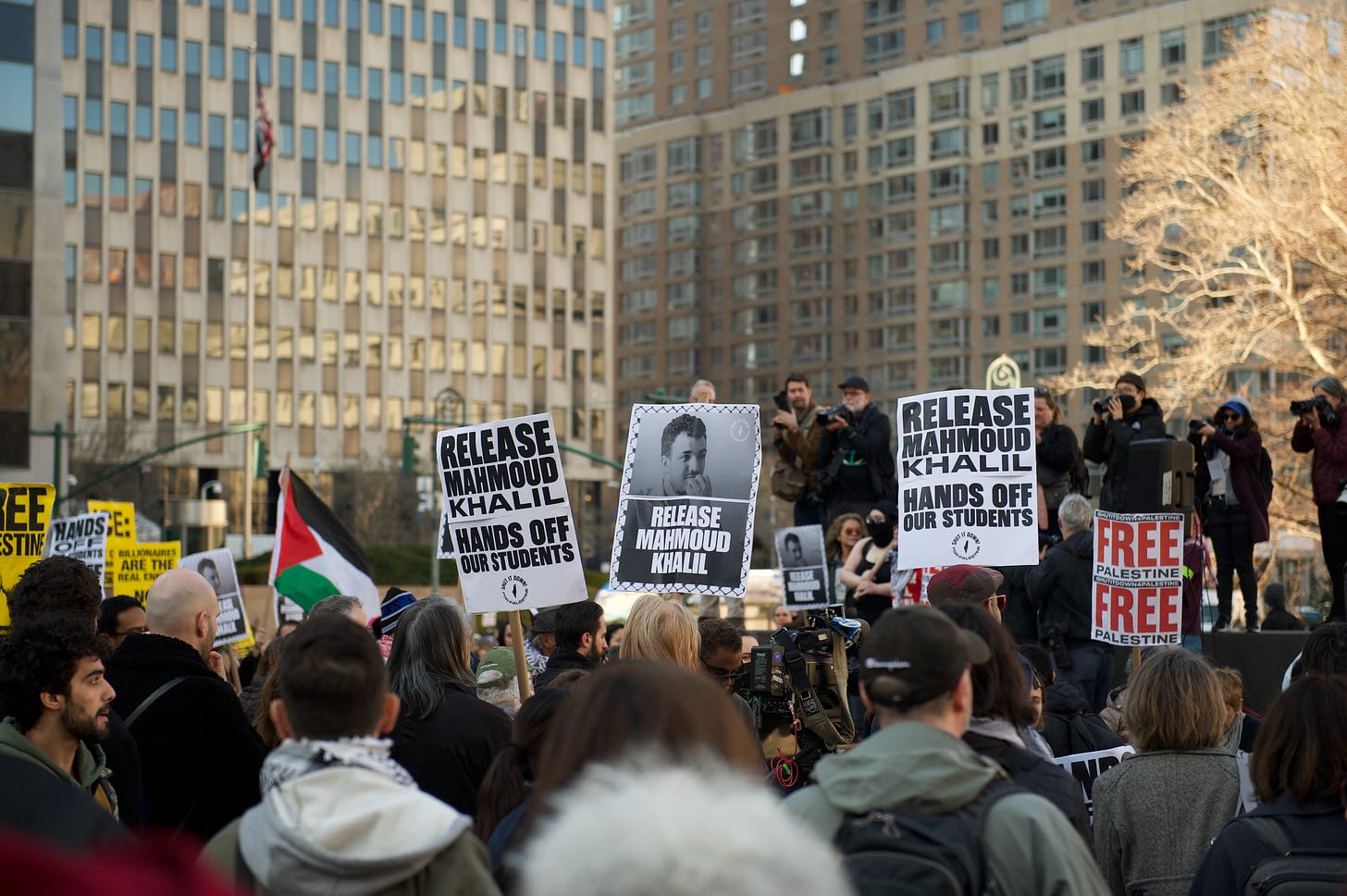
Mahmoud Khalil is an Algerian citizen of Palestinian heritage who held a U.S. green card (lawful permanent resident status). His involvement in pro-Palestinian protests at Columbia University in 2024–2025 places him at the center of a complex intersection between campus activism, U.S. foreign policy, and immigration enforcement.
A.) Early 2024–Fall 2024
Graduate Studies at Columbia
Program Details: Khalil was enrolled in Columbia University’s School of International and Public Affairs, focusing on public administration or a closely related field.
Advocacy Groups: He joined campus organizations addressing the Israel–Hamas conflict, particularly emphasizing humanitarian conditions in Gaza and critiquing Israeli military operations.
Protests & Encampments
Calls for Divestment: Many student groups, including those Khalil affiliated with, demanded Columbia divest from companies believed to supply arms or technology to the Israeli military.
Radical Factions: Certain protestors went further, praising Hamas openly—an act that carries legal and political weight in the U.S., where Hamas is classified as a terrorist organization.
Khalil’s Position: Khalil publicly distanced himself from any endorsement of Hamas’s violence. His stated aim was pressuring the university to adopt ethical investment policies and seeking a ceasefire in Gaza.
B.) October 2024
University Disciplinary Investigations
Context: After a high-profile rally in which some participants glorified the October 7 Hamas attacks, Columbia launched internal reviews to assess whether any student facilitators had incited or justified terrorism.
Khalil’s Role: As an organizer or spokesperson, Khalil was scrutinized for enabling events where pro-Hamas rhetoric was present. He testified he only negotiated on behalf of demonstrators and was not responsible for—or aligned with—messages endorsing violence.
Campus Atmosphere
Heightened Tensions: The Israel–Hamas conflict is historically charged, and the inclusion of pro-Hamas chants escalated tensions among Jewish students, faculty, and external observers.
Administrative Pressures: Universities often strive to balance free expression with safeguarding students from threats or intimidation, leading to official inquiries that can implicate protest organizers—even when their personal stances are non-violent.
C.) Early March 2025
Arrest by ICE
Timeline: On March 8, 2025, Immigration and Customs Enforcement (ICE) officers detained Khalil at his residence on campus.
Official Justification: Under a rarely invoked provision of the Immigration and Nationality Act (INA), the administration alleged Khalil’s actions were akin to supporting Hamas, thus endangering U.S. foreign policy interests.
Legal Consequences
Possible Deportation: Khalil faced potential revocation of his green card. National security/foreign-policy grounds for removal require a lower evidentiary threshold than criminal charges, meaning no proof of direct terrorist involvement is needed.
Symbolic Enforcement: Many see this as a sign the Trump administration is determined to clamp down on pro-Hamas or anti-Israel sentiments among non-citizens, especially on college campuses.
D.) Mid-March 2025
Nationwide Protests & Injunction
Student Solidarity: Khalil’s arrest triggered widespread demonstrations at universities including UCLA, Berkeley, and NYU. Protesters framed the case as a blatant attempt to suppress non-citizen activism.
Legal Action: On March 12, a federal judge granted a temporary injunction blocking Khalil’s immediate deportation, allowing him to challenge the government’s allegations in court.
Administration’s Defense
Official Statements: Secretary of State Marco Rubio defended the move, arguing the government must act decisively to prevent the legitimization of groups that threaten American allies—chiefly Israel.
Rights Divide: Rubio and other officials stressed that while citizens have strong constitutional protections, non-citizens can be removed if their speech or conduct is deemed contrary to U.S. national security or foreign-policy objectives.
IV. Potential Support for Hamas by Proxy?
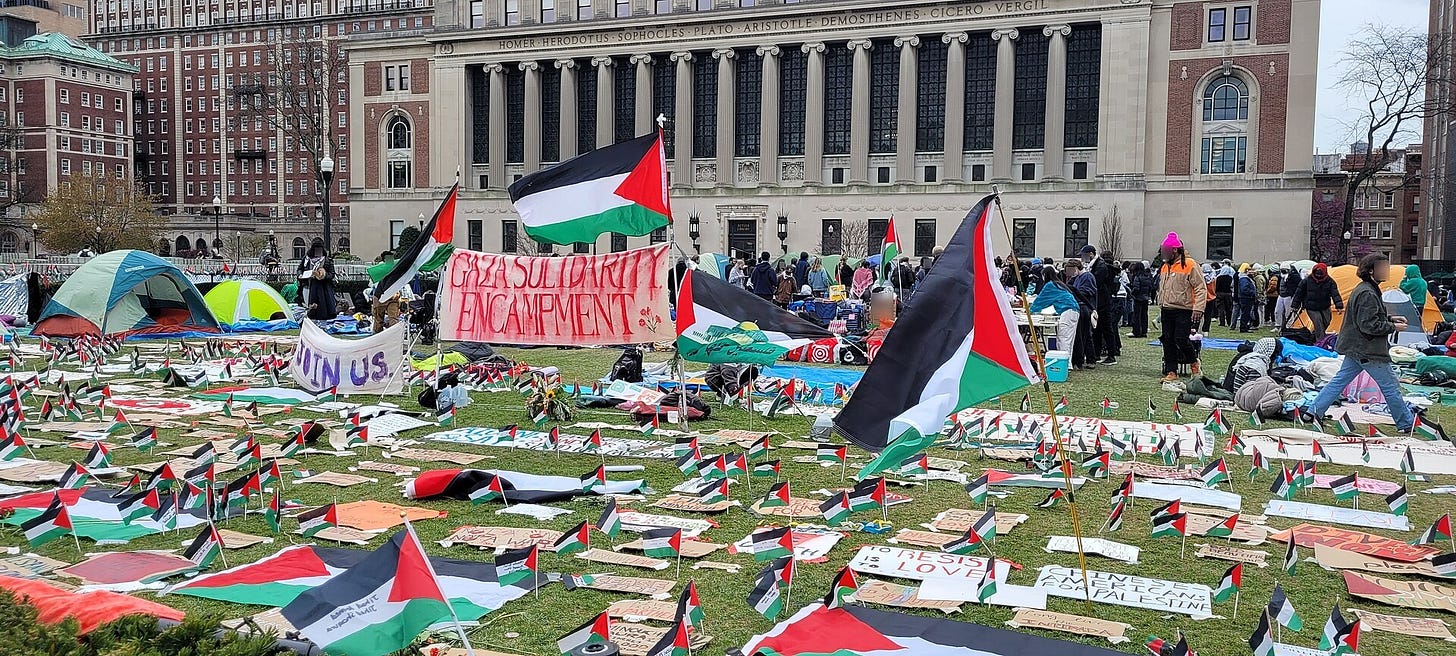
Many observers view the crux of Mahmoud Khalil’s deportation case as rooted in a broader issue:
Does pro-Palestinian advocacy inevitably translate into endorsing Hamas, especially when Hamas wields actual governance in Gaza and currently enjoys significant popular support among Palestinians?
From the U.S. perspective—where Hamas is a designated Foreign Terrorist Organization (FTO)—any perceived endorsement of Hamas-led governance or its militant actions can be treated as tacit backing of a hostile entity.
A.) Hamas’s Election & Rising Popularity
The 2006 Legislative Victory
Democratic Paradox: In January 2006, Hamas won a majority in the Palestinian Legislative Council, effectively becoming the ruling authority in Gaza. This electoral success created a diplomatic dilemma for Western governments that consider Hamas a terrorist entity.
Consolidation of Power: Over subsequent years, Hamas solidified its governing role in Gaza, making it difficult to separate “support for Gaza” from “support for Hamas” in the eyes of those who define Hamas as inherently terrorist.
Recent Poll Data
December 2023 PCPSR Findings: Surveys indicated approximately 72% of Palestinians considered the October 7 attack on Israel “correct,” and 85% of West Bank respondents expressed satisfaction with Hamas’s wartime actions.
Implication: Such high levels of public approval can lead U.S. authorities to conflate “pro-Palestinian” sentiment with de facto endorsement of Hamas, reinforcing the argument that praising the Palestinian cause equates to praising a U.S.-designated terror group.
B.) The Support-by-Proxy Argument
Endorsing a Hamas-Led Government
Legal Designation: Under U.S. law, Hamas is a terrorist organization. Any public remarks or demonstrations that celebrate its leadership or military maneuvers risk being interpreted as endorsing terror.
Interpretative Approach: If activists publicly champion “the will of the Palestinian people”—particularly when polls show Hamas is favored—officials may interpret that as tacit approval of a hostile entity.
Critics’ Counterpoint
Humanitarian vs. Militant: Many activists emphasize that defending civilian rights in Gaza is distinct from endorsing Hamas’s violent tactics. They condemn terror attacks while simultaneously seeking to lift blockades or end occupations.
U.S. Government’s Position: The administration often applies a narrower lens: if any segment of a protest group praises Hamas or brandishes its symbols, officials can treat the entire group as aligned with a terrorist cause, thus implicating its leaders.
C.) Implications for Khalil (Guilt by Association?)
Leadership in a Pro-Hamas Environment
Presence of Radical Elements: Even if Khalil’s personal statements were moderate, his leadership in Columbia University Apartheid Divest (CUAD)—where some participants allegedly glorified the October 7 attack—may suffice legally for the government to argue “guilt by association.”
Facilitation Role: As a spokesperson or organizer, Khalil may be seen as aiding the platforming of pro-Hamas rhetoric, which crosses the threshold of “foreign-policy threat” under certain INA provisions.
National Security Justification
INA § 237(a)(4): This statute authorizes removal if the State Department deems a non-citizen’s presence injurious to U.S. foreign policy. Actual incitement or material support is not required; association or facilitation can be enough.
Perceived Endorsement: With polls showing strong Palestinian support for Hamas and certain protest materials praising Hamas operations, Khalil’s involvement can be cast as tacit approval—an interpretation that often holds sway in immigration courts.
Overall: Poll data underscoring strong Palestinian support for Hamas lends weight to the U.S. government’s assertion that “backing Palestine” is effectively “backing Hamas.” While Khalil and others contend they oppose militant tactics, the presence of pro-Hamas rhetoric and the broader reality of Hamas’s governance—coupled with a majority of Palestinians openly applauding the Oct. 7 attack—can be interpreted by American authorities as tacit terrorist support. For non-citizens like Khalil, this has significant legal consequences under U.S. immigration and foreign-policy provisions.
V. The Trump Administration’s 3 Specific Claims
The administration contends that Mahmoud Khalil’s behavior amounted to supporting terrorism or anti-American interests.
While no criminal charges for terrorism were filed, the government relies on circumstantial evidence and a foreign-policy clause in the INA.
It is unclear as to whether there is evidence to support the idea that Khalil engaged in any specific crimes (i.e. broke laws) while in the U.S.
1.) Pro-Hamas Messaging by CUAD
Group Statements
October 9, 2024 Publication: Columbia University Apartheid Divest (CUAD), the student group Khalil helped lead, disseminated material describing Hamas’s October 7 operation—what Hamas itself termed “Al-Aqsa Flood”—as a “moral, military, and political victory.”
Praise for Hamas Leadership: The publication quoted Hamas political bureau chief Ismail Haniyeh in a way U.S. officials interpret as sympathetic or supportive of Hamas’s agenda.
Khalil’s Role
Leadership Influence: Khalil served as CUAD’s negotiator/spokesperson, placing him in a visible organizational role.
Government Perspective: The administration asserts that being in a leadership position inherently makes Khalil responsible for, or complicit in, official group statements—particularly when those statements glorify a U.S.-designated terrorist group.
Khalil’s Defense: Supporters argue he focused on promoting divestment strategies and never personally endorsed, composed, or approved incendiary language.
2.) Alleged Threats to Jewish Students
University Investigations
Complaints & Testimonies: Columbia’s disciplinary reviews included accusations that Khalil harassed or threatened Jewish students, potentially escalating campus tensions.
Task Force Findings: A campus investigative panel ultimately did not find conclusive evidence tying Khalil to threatening or antisemitic statements, instead noting he often attempted to keep protests peaceful.
White House Narrative
“Intimidation” Claim: Despite the task force’s inconclusive findings, the Trump administration insists Khalil’s activism created a hostile environment for Jewish students and staff—a factor supporting his removal.
Unverified Professor’s Social Media Post: One professor alleged online that Khalil said “Zionists don’t deserve to live,” though Khalil categorically denies ever using such language. Official bodies at Columbia have not substantiated this claim.
3.) CUAD’s Radical Rhetoric
Online Footprint
Social Media Content: CUAD’s official accounts posted phrases like “continue to escalate until the empire crumbles” and lauded the “Palestinian resistance.” Some posts reportedly hailed arson attempts by an extremist faction, though verification of these events remains murky.
Lack of Direct Evidence Against Khalil: There is no indication Khalil personally authored or endorsed radical or violent postings; his supporters maintain he refrained from physical property occupations or other forms of high-risk activism due to concerns for his immigration status.
Critics’ Perspective
Imputation of Responsibility: Critics note the administration is employing a “guilt-by-association” tactic, conflating Khalil’s membership in a protest group with the more incendiary views of certain CUAD members.
National-Security Paradigm: From the government’s standpoint, however, involvement in an organization that overtly praises a U.S.-designated terrorist entity is sufficient grounds for deportation under immigration law—even without evidence of personal wrongdoing.
VI. What the Trump Administration Invoked & Likely Rationale
A.) Foreign-Policy Grounds for Deportation
INA Provisions
INA § 237(a)(4): This statute empowers the Secretary of State or Attorney General to remove a non-citizen whose actions or presence “adversely affect U.S. foreign policy or national security.”
Broad Discretion: Unlike criminal terrorism charges—which require proof of material support or explicit incitement—these foreign-policy clauses allow authorities to act preemptively on a lower evidentiary threshold.
Linking Khalil’s Activism to Hamas
Designation of Hamas: Because Hamas is officially recognized by the U.S. as a Foreign Terrorist Organization, any public alignment with its messaging or moral support can be construed as a threat to U.S. strategic interests.
Group Affiliation: By referencing CUAD’s pro-Hamas statements, officials frame Khalil’s spokesperson role as effectively endorsing, or at least tolerating, a terrorist group’s actions.
Choice of a Rarely Used Clause
Criminal vs. Administrative Process: Khalil is not charged with “material support for terrorism” under criminal law. Instead, the administration relies on a seldom-invoked foreign-policy removal provision that bypasses the higher burden of criminal prosecution.
Implications: This approach underscores the expansive authority immigration agencies have to remove non-citizens for perceived ideological or political threats, rather than specific criminal conduct.
B.) Likely Rationale
Preemptive National Security
Hostile Organization Risk: U.S. officials argue that tolerating any endorsement—or perceived endorsement—of Hamas within American borders could encourage extremist networks or normalize support for violent actors.
Israeli Alliance: Israel is a key U.S. ally, so championing an entity actively attacking Israel is often considered anti-American in a foreign-policy sense.
Strict Citizen vs. Non-Citizen Divide
Constitutional Protections: While citizens are constitutionally safeguarded against deportation for controversial speech, non-citizens have a conditional status that can be revoked upon demonstrating “threat to foreign policy.”
Reinforcing the Guest Analogy: The administration’s position effectively underscores the logic of: “If you voice support for our enemies, you lose the privilege of staying here.”
“Guest in a Home” Ethos
Moral Justification: Officials defend the arrests and deportations of non-citizens who appear to side with hostile actors as a straightforward application of sovereignty. Just as a homeowner would ask a disruptive guest to leave, a government can remove perceived threats to its national interests.
Political Calculations: The Trump administration’s base often favors unequivocal support for Israel; removing perceived pro-Hamas activists resonates with a segment of the electorate demanding robust action against potential threats.
VII. Broader Implications of Allowing Maximum “Free Speech” to Non-Citizens
A.) Potential Social & Political Tensions
Polarization on Campus
Increased Friction: High-profile international issues, like the Israel–Palestine conflict, can fracture university communities across religious, ethnic, or ideological lines.
Administrations Under Pressure: University leaders must balance the desire to protect free inquiry with the duty to ensure students’ safety and abide by relevant laws.
Over-Correction or Chilling Effect
Risk of Suppressing Legitimate Dissent: A severe crackdown on pro-Palestinian or pro-Gaza activism may conflate humanitarian advocacy with terrorism support, potentially silencing moderate voices.
Impact on Future Activism: Non-citizen students aware of Khalil’s situation might self-censor in debates or protests that touch on sensitive foreign-policy matters—fearing deportation if accusations of “terror endorsement” arise.
B.) Nation-State Cohesion & Security
Sovereign Right to Control Borders
International Norms: All countries reserve the authority to expel non-citizens who pose real or perceived threats to domestic order or political alliances.
Protecting National Interests: Underlying the Khalil case is the prerogative of the U.S. to prioritize national security and alliances, reaffirmed by the immigration statutes.
Deterring Foreign Influence or Propaganda
Government Justification: Authorities argue that lax enforcement against perceived terror sympathies could embolden extremist recruitment.
Deterrent Message: High-profile deportations signal that aligning with or praising America’s adversaries—especially designated terrorist groups—will be met with swift immigration consequences.
C.) Free Speech vs. Immigration Law
Tension with the First Amendment
Robust but Not Absolute: While courts have repeatedly upheld free-speech rights for all persons in the U.S., immigration law effectively acts as an exception mechanism, enabling the government to remove non-citizens under discretionary standards that would be inapplicable to citizens.
Foreign Policy “Override”: In sensitive areas—like alliances or terrorism designations—immigration authorities can prioritize national-security considerations over the individual’s expressive freedom.
Lower Evidentiary Burden
Security vs. Criminal Threshold: In deportation hearings grounded in “foreign-policy concerns,” the government generally does not need the same level of proof required to convict someone of a crime.
Implication for Activists: This dynamic can turn broad, politically charged statements or associations into a viable basis for revocation of legal status.
VIII. Recap: Mahmoud Khalil Analysis
A. Was Khalil Stoking Anti-American Sentiment or Threatening U.S. Interests?
Administration’s Allegation
Tacit Hamas Support: By participating in protests where Hamas was glorified, Khalil—according to the government—indirectly bolstered a terrorist entity hostile to Israel and, by extension, to American foreign-policy goals.
Campus Environment: Officials also highlight reported intimidation of Jewish students, asserting Khalil fostered or failed to condemn antisemitic hostility.
Khalil’s Defense
Denial of Violence: Khalil has consistently claimed his activism sought to spotlight humanitarian concerns in Gaza, not justify terrorism.
No Criminal Charges: Khalil faces administrative deportation proceedings rather than criminal prosecution, suggesting authorities might lack evidence of direct terror financing or incitement.
Credibility Considerations
Guilt by Association: Much of the case hinges on pro-Hamas slogans from some CUAD members, not necessarily from Khalil himself.
Mixed Public Perception: While critics see an overreach criminalizing peaceful dissent, supporters of the administration view the crackdown as a necessary measure against potential threats.
B. Common Sense Policy vs. Overreach
Argument for Common Sense
Safeguarding Allies: Many accept that harboring non-citizens aligned with a U.S.-designated terrorist group is risky, justifying deportation as a precautionary step.
International Norm: Removing disruptive or subversive “guests” is consistent with global immigration policies.
Argument for Overreach
Chilling Effect: Civil liberty advocates argue that punishing group association sets a dangerous precedent, stifling legitimate advocacy out of fear of deportation.
Discriminatory Focus: There is concern the approach disproportionately targets Muslim, Arab, or pro-Palestinian voices, conflating political dissent with extremism.
Striking a Balance
Delicate Questions: The Khalil case spotlights the challenge of balancing free speech—especially in university settings—against legitimate security considerations.
Legal Gray Area: The threshold between protected activism and inadmissible terrorist alignment remains hotly debated.
C. Likely Justification for Deportation
Legal Strength of the “Foreign-Policy Clause”
Low Evidentiary Bar: Immigration adjudicators often grant broad deference to State Department or DHS determinations that a non-citizen’s presence undermines national security.
Outcome: Even absent proof of personal involvement in terrorism, Khalil’s leadership in an organization praising Hamas could suffice to revoke his green card.
Political Dimension
Hardline Security Approach: The Trump administration’s stance aligns with a political narrative favoring zero tolerance for real or perceived terror support.
Campus Freedom Concerns: Critics caution that punishing speech-related associations sets a worrisome precedent for academic discourse and protest movements.
IX. Logical Determination
A.) Foreign Policy Logic
Hamas Ruling Gaza
Post-2006 Reality: With Hamas in control of Gaza, endorsing or appearing to legitimize Gaza’s governing authority can be construed by the U.S. as supporting a terrorist organization.
Ally Protection: Because Israel is a primary U.S. partner in the Middle East, any perceived endorsement of Hamas naturally raises red flags in Washington.
Alignment Against an Ally
Policy Perspective: Aligning with an adversary of a key ally can be defined as “anti-American interests,” prompting immigration enforcement under the INA.
B.) Evidence-Based Scrutiny
Actual Direct Support?
No Criminal Incitement: Authorities have not alleged Khalil provided material aid, money, or operational assistance to Hamas.
Association Threshold: The deportation rationale hinges on circumstantial factors—Khalil’s organizational role amidst pro-Hamas rhetoric and polling data showing wide Palestinian support for Hamas—rather than direct evidence of wrongdoing.
Guilt by Association Debate
Legal Precedent: Immigration law often accepts association or membership in a group advocating violence as grounds for removal, short of proving the individual actively facilitated terrorist operations.
Advocacy vs. Subversion: This broad standard troubles civil libertarians who argue non-citizen activists can be penalized simply for sharing political platforms with more extreme elements.
C.) Free Speech vs. National Security
Potential Chilling Effect
Implications for Non-Citizen Students: Heightened enforcement can dissuade foreign students from voicing opinions on contentious global issues—a phenomenon at odds with the ethos of open academic discourse.
Impact on Debate: Topics like Israel–Palestine may become “no-go zones” for non-citizens, shrinking the breadth and richness of campus conversations.
Legitimate Government Interest
Preventing Terror Influence: A portion of the American public backs strict measures to prevent any semblance of terrorist glorification.
Executive Discretion: Successive administrations have repeatedly been granted judicial deference on immigration matters tied to national security, reinforcing the notion that the government’s prerogative is primary when balancing these interests.
Deportation?
Legally Plausible: Given the INA’s foreign-policy clause and the discretionary power granted to immigration authorities, there is a strong likelihood a court might side with the government if it deems Khalil’s activism detrimental to U.S. interests.
Overreach Accusations: Opponents insist this sets a harsh precedent—punishing lawful residents for controversial speech and activism in a manner fundamentally opposed to the spirit of the First Amendment.
Final Take: Mahmoud Khalil 2025 (I Don’t Care)
Unless the U.S. government and/or law enforcement and/or intelligence agencies have specific evidence that Khalil himself engaged in pro-Hamas demonstrations (i.e. posts, chants, etc.) AND/OR broke any other laws (e.g. disturbing the peace, assault, etc.) — I do not think Khalil should be detained or deported.
I understand the hawkish stance from Trump et al. — especially given the insane woke infiltration at American universities under Biden. Biden likely let non-citizens break U.S. laws ad infinitum — and clearly let non-citizens protest against the foreign policy interests of the U.S. with zero repercussions.
This included things like: setting up encampments, occupying buildings, trespassing, etc. Biden essentially welcomed an anti-American Trojan Horse of non-citizens… Trump is signaling loudly: enough of this bullshit.
I do think the Trump admin’s reaction reaction here is potentially an overreach… it may amplify things and/or lead to a domino-effect woke protest spiral that could end up far more of a nuisance than Khalil et al.
Ideally the Trump admin focuses specifically on detainment and deportation of foreigners for whom there’s clear evidence to support illegal activities in the U.S.
What we have here is: (1) an ultra-hawkish reaction from the Trump admin and (2) braindead decision-making/life choices by Khalil (assuming he valued his U.S. education)… why risk your entire education and assume you’re invincible in a foreign country while leading a group containing pro-Hamas members — while Trump is president?
Even if Khalil personally never broke the law or directly voiced support for Hamas — he was associating with those who clearly did (leading the damn group).
I don’t really care what happens in his case. This isn’t some “slippery slope” — it’s basic common sense. How to behave in the U.S. as a foreign student should be pretty easy to figure out. Go to school, take up some normal hobbies (maybe basketball), and avoid political bullshit.
So no, I don’t really care much what happens with his case. Khalil could win in a court challenge if there isn’t any dirt on him.
If other non-citizens fear deportation, maybe they’ll start behaving better and start actually respecting the U.S.?
Trump may have scared some non-citizen/foreign student activists enough to focus more on their education instead of risking it all to be part of a protest that has basically nil/zero impact on what actually happens — while a guest in U.S.A.


